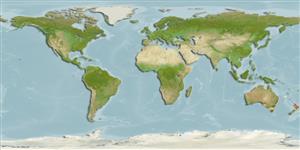Teleostei (teleosts) >
Perciformes/Serranoidei (Groupers) >
Epinephelidae (Groupers)
Etymology: Epinephelus: Greek, epinephelos = cloudy (Ref. 45335).
Eponymy: Eduard C F Dämle, also known as Dämel or Daemel (1821–1900), was a German entomologist, and a collector and dealer in natural history specimens. [...] (Ref. 128868), visit book page.
More on author: Günther.
Environment: milieu / climate zone / depth range / distribution range
Ecology
Marine; reef-associated; depth range ? - 50 m (Ref. 5222). Subtropical; 25°S - 43°S, 136°E - 177°W (Ref. 5222)
Southwest Pacific: Australia, Lord Howe Island, Norfolk Island, Kermadec Islands and New Zealand (North Island and Poor Knights Island). The Australian range extends from southern Queensland to Kangaroo Island off South Australia; also reported from the Bass Strait.
Size / Weight / Age
Maturity: Lm ? range ? - ? cm
Max length : 200 cm TL male/unsexed; (Ref. 9710); max. published weight: 68.0 kg (Ref. 4787)
Found on rocky substrata from near shore to at least 50 m. It is an aggressive territorial species that may occupy a particular cave for life. Small individuals feed on crabs and small fishes. Sexual transition reported to occur at 100-110 cm (Ref. 6787). Large individuals are often attracted by divers (Ref. 9710). An esteemed food fish avidly sought by anglers and spear fishermen.
Life cycle and mating behavior
Maturity | Reproduction | Spawning | Eggs | Fecundity | Larvae
Heemstra, P.C. and J.E. Randall, 1993. FAO Species Catalogue. Vol. 16. Groupers of the world (family Serranidae, subfamily Epinephelinae). An annotated and illustrated catalogue of the grouper, rockcod, hind, coral grouper and lyretail species known to date. Rome: FAO. FAO Fish. Synop. 125(16):382 p. (Ref. 5222)
IUCN Red List Status (Ref. 130435: Version 2024-2)
Threat to humans
Harmless
Human uses
Fisheries: subsistence fisheries; gamefish: yes
Tools
Special reports
Download XML
Internet sources
Estimates based on models
Preferred temperature (Ref.
123201): 16.4 - 24.3, mean 17.9 °C (based on 56 cells).
Phylogenetic diversity index (Ref.
82804): PD
50 = 0.5000 [Uniqueness, from 0.5 = low to 2.0 = high].
Bayesian length-weight: a=0.01175 (0.00568 - 0.02430), b=3.04 (2.88 - 3.20), in cm total length, based on LWR estimates for this Genus-body shape (Ref.
93245).
Trophic level (Ref.
69278): 4.0 ±0.70 se; based on food items.
Resilience (Ref.
120179): Very Low, minimum population doubling time more than 14 years (Preliminary K or Fecundity.).
Fishing Vulnerability (Ref.
59153): Very high vulnerability (90 of 100).
Nutrients (Ref.
124155): Calcium = 7.69 [2.83, 18.19] mg/100g; Iron = 0.356 [0.177, 0.770] mg/100g; Protein = 19.4 [17.8, 20.9] %; Omega3 = 0.139 [0.071, 0.276] g/100g; Selenium = 23.2 [10.1, 51.6] μg/100g; VitaminA = 61.1 [13.9, 265.1] μg/100g; Zinc = 0.665 [0.427, 1.019] mg/100g (wet weight);
